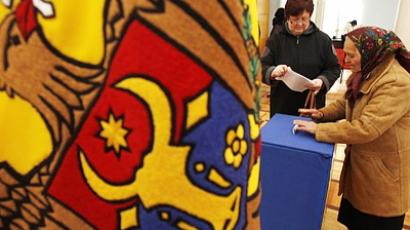Moldovan TV broadcasts more than just entertainment

A range of new media outlets in Moldova are being accused of trying to influence audiences politically. Critics say Romanian sponsors control the content of TV news and publications to promote reunification with the country.
The Moldovan press seems to have undergone something of a makeover in the past year, with new TV programs airing different opinions. So, is the media becoming stronger and freer after years of domination by only a few outlets? It may seem so on the surface, but some, like online journalist Vitaly Andrievsky, say the idea of a new dawn is only an illusion.“When my website gained popularity, some people from Romania contacted me and offered financial help,” he said. “But in exchange they wanted my website to support the idea of reunification between Moldova and Romania – something that three-quarters of our population rejects.”Before 1945, Moldova belonged to Romania. After the war it became part of the Soviet Union, then gained independence after the collapse of the USSR. Since then, however, some politicians in Bucharest have been wanting it back. Andrievsky says now they can use the media as a platform, as most of the new press is sponsored by Bucharest. One of the most recent additions to Moldova’s media market is a quality publication called Adeverul – “The Truth,” which is also the name of a leading national daily in Romania. The very first edition of this Romanian newspaper in Moldova had some sharp articles. It speculated whether Moldova was a toy between Brussels and Moscow. And it also questioned FIFA’s decision to grant Russia the right to host the 2018 football World Cup.It is the first full-color paper in Moldova, and is published in the Romanian language, rather than Moldovan. Its deputy editor-in-chief, Aureliu Cornescu, says this is not an obstacle. “Seventy-five percent of Moldovans speak Romanian,” he said. “And this is a fact proved by the academy of sciences. Besides, our balanced approach to news is something new for this country.” Opposition politicians believe such strong media influence from Bucharest could threaten Moldova’s sovereignty. “The campaign that is being run by the local press… is constructed in a way to make ntegration possible by camouflaging it through so-called European integration,” said Parliament member Yuriy Muntyan.Those promoting the Romanization of Moldova have not been shy of using rather underhand methods, says political expert Bogdan Tsyrda.“Moldovan cable operators, which broadcast Russian stations, insert Romanian programs into the Russian channel’s airtime,” Tsyrda said. “Programs which propagandize Bucharest’s wish to seize back Moldova. So they use Russian stations to deliver ideas Moscow would never agree with.”Opinion polls suggest that the number of Moldovans wanting to reunite with Romania has tripled over the last 12 months, from just 5 per cent to 15 per cent. Whether that is a result of the media is difficult to say for sure – but those who promote reunification certainly see the press as a key way to increase their influence.














